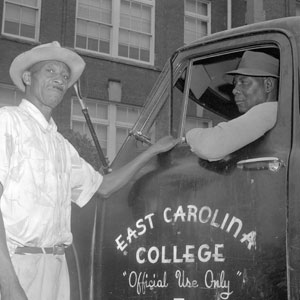
Campus media rarely highlighted African-American staff who worked to improve the quality of life at East Carolina. Early on, in covering the aftermath of a cafeteria fire, the Training School Quarterly ran a picture including staff preparing food in the repaired kitchen. The intent was not to feature African-American staff, but nevertheless the photo is the first portraying them as a part of campus life. The Tecoan later devoted a full page to African-American workers on campus, declaring, with appreciative condescension, “We couldn’t do it without them.” Even worse, until the 1960s, the Buccaneer typically cast African-Americans in the form of black-faced white students performing minstrel skits. Such insensitive displays were campus-driven expressions of Jim Crow arrogance in the guise of undergraduate amusement.
Things changed with the 1960s. While Jim Crow sensibilities continued throughout the decade and beyond in various forms, counterstatements increasingly expressed measured respect for African-American staff and their contributions to campus life. A summer 1960 issue of the East Carolinian included an article on David Langley, “maintenance worker.” It noted that in East Carolina’s 53 year history, there had been “many different personalities,” adding that “David Langley has been a part of this history.” Neither a “visiting notable” nor a “great leader,” Langley nevertheless devoted “thirty-three years” to the school as “part of the maintenance staff” doing “everything from truck driver to yardman.” Although the East Carolinian did not emphasize this, at the time of Langley’s retirement, he had seen over half of the school’s past, from 1927-1960, longer than any other person on campus.
Some of Langley’s memories were recorded in detail. He noted how there had only been one paved street on campus – behind the administration building – when he began work at ECTC. Langley added that he had helped pour the cement for it, and for all of the sidewalks then on the campus. He added that he had seen enormous growth in student enrollment over the years, remembering back to when women outnumbered the men by a sizeable number.
A Pitt County native, Langley resided at 808 Fleming Street and was a member of the Sycamore Hill Baptist Church. The 1940 Census indicates that he owned his home, valued at $2,000.00, had a fourth grade education, and earned $528.00 annually. Langley’s salary was, incidentally, well below the 1940 median of $956.00. Following his passing in 1973, Langley was buried in Brown Hill Cemetery in Greenville. His son, David Jr., also worked on campus, as a dishwasher in the dining hall.
In 1970, a decade after the Langley article, the Fountainhead (formerly, the East Carolinian) ran a piece on the retirement of a facilities employee, John Henry Corey. A resident of 1300 West Third Street, Corey completed seventh grade, owned his home valued at $1,000.00, and earned, according to the 1940 census, a below-median salary of $700.00 a year. Before joining the ECTC staff, Cory had farmed in Pitt County. The Roosevelt administration’s Work Projects Administration program made it possible for ECTC to hire Corey in 1934 as a grounds crew laborer. He soon became a full-time employee and was promoted to truck driver for the maintenance department. In the featured picture, dated 1958, David Langley is pictured on the left, while John Henry Corey is seated in the truck on the right.
During his 36 years at East Carolina, Corey served under five presidents, all of whom, reportedly, “knew him on a first name basis.” Recalling his days, Corey noted that east of Wright Building, there had once been a cabbage and collard patch. Corn, tomatoes, potatoes, and squash were also grown there. Hogs were raised and killed “when the frost came.” The pork and produce raised, presumably by the maintenance staff, supplied the kitchen and was served to ECTC students, faculty, and staff in the cafeteria. According to Corey, he planted, pruned, or tended most of the “plants, shrubs, and ornamentals on campus.”
In recognition of his 36 years of service, Corey received a “special certificate” at commencement signed by President Leo W. Jenkins. This growing acknowledgement of East Carolina’s African-American maintenance staff reflected gradual progress away from Jim Crow arrogance and toward a greater willingness to recognize the integrity and dignity of all who contributed to the growth and well-being of the school community.
Sources
- "Cabbage and collards grew on Mall in past." Fountainhead. June 29, 1970. Pp. 5-6. https://digital.lib.ecu.edu/39480.
- "David Langley." 1940 United States Federal Census. Greenville, Pitt, North Carolina; Roll: m-t0627-02959; Page: 1A; Enumeration District: 74-34. Sheet no. 15A.
- "John H. Corey." 1940 United States Federal Census. Greenville, Pitt, North Carolina; Roll: m-t0627-02959; Page: 1A; Enumeration District: 74-34. Sheet no. 1A.
- "Maintenance Worker: Dave Langley Retires Long Service to ECC." East Carolinian. July 21, 1960. Vol. 35, no. 32. P. 3. https://digital.lib.ecu.edu/38667.
- McLawhorn, Bill. "Workers build campus." Fountainhead. June 29, 1970. Pp. 1, 5. https://digital.lib.ecu.edu/39480.
- "Obituary: David Langley." Daily Reflector. July 19, 1973. P. 8.
- "Obituary: John Henry Corey." Daily Reflector. February 11, 1975. P. 6.
Citation Information
Title: Facilities Staff: Dave Langley (1895-1973) and John Henry Corey (1904-1975)
Author: John A. Tucker, PhD
Date of Publication: 7/18/2019